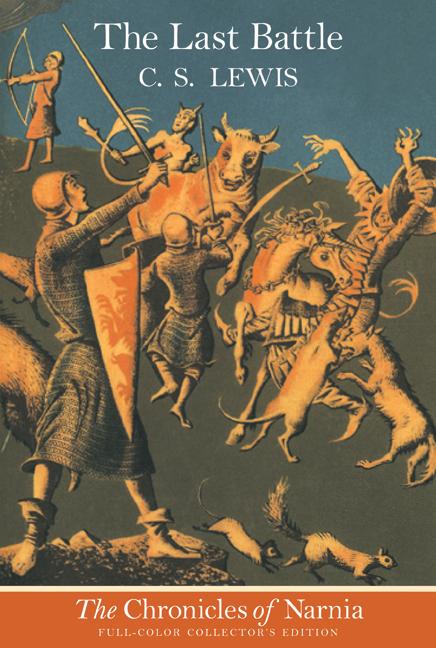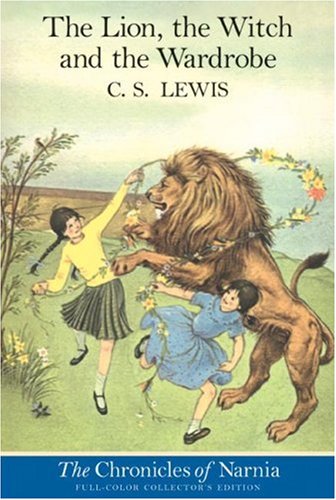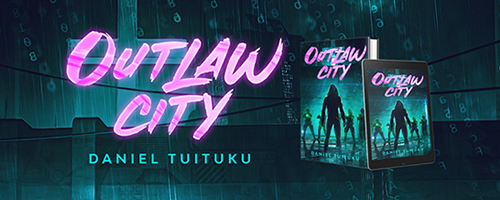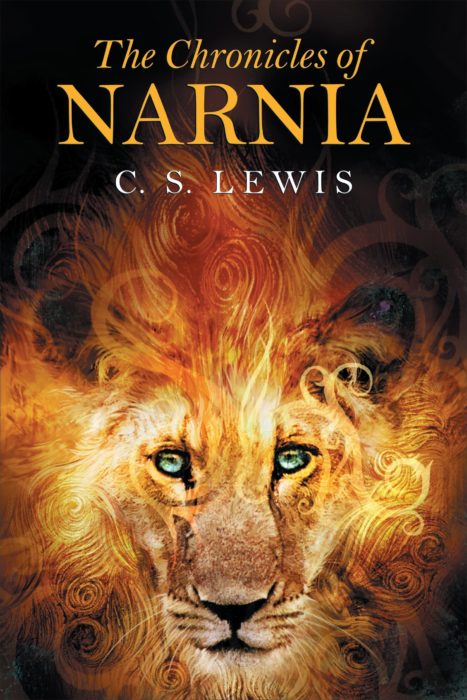26. How Do We Defeat the Top Seven Myths about The Chronicles of Narnia? Part 2
Podcast: Play in new window | Download (Duration: 1:26:05 — 80.2MB) | Embed
Does the wardrobe equal the Bible, the White Witch equal Satan, and Peter equal—well, Peter? Some people read C. S. Lewis’s Chronicles of Narnia series as if only its “allegories” matter. Should you? That’s one of our four myths we explore in this episode to conclude our Narnia’s Top Seven Myths series.
4. Queen Susan “fell away” and will never return to Narnia again.
- This myth arises near The Last Battle‘s end, when Aslan is making all things new.
- Much virtual and real ink has been spilled asking what happened to Susan?
- Some feminists and many atheists really hate this part.
Phillip Pullman says (source):
This seems to me on the part of Lewis to reveal very weird unconscious feelings about sexuality. … It’s a filthy thing to do. Susan is shut out from salvation because she is doing what every other child who has ever been born has done – she is beginning to sense the developing changes in her body and its effect on the opposite sex.
Emily Wilson in the New Republic says:
poor Susan cannot get into heaven because she starts wearing lipstick …
- “I don’t know, therefore aliens,” seems to become, “I don’t know, therefore, sex.”
- From reading the text, we actually see it’s not really about makeup or sex.
- How absurd. Lewis is all about the original goodness of God’s created gifts.
- It’s not about “growing up.” It’s about the vanity we claim is “growing up.”
- Only if you assume one is “grown up” at this age would you reject Lewis here.
Lewis himself answered the question. In 1960 a reader named Pauline Bannister asked Lewis about Susan. He replied:
Dear Pauline Bannister
I could not write that story [about Susan’s future?] myself. Not that I have no hope of Susan’s ever getting to Aslan’s country, but because I have a feeling that the story of her journey would be longer and more like a grown-up novel than I wanted to write. But I may be mistaken. Why not try it yourself?
—from The Collected Letters of C. S. Lewis, Volume 3: Narnia, Cambridge, and Joy, pages 1,135–1,136
- Lewis literally asks his reader to consider fanfiction. “Why not try it yourself?”
- Of course, he suggests this long before fanfiction became a huge “industry.”
- But it’s very clear Lewis believes Susan will someday return to true Narnia.
 3. Emeth in The Last Battle reveals that C. S. Lewis was a universalist.
3. Emeth in The Last Battle reveals that C. S. Lewis was a universalist.
This one gets complex. Again, we could have a whole episode here.
- It deals with Emeth, a Calormene (not a Narnian) in The Last Battle.
- Near Narnia’s end, Emeth enters a stable and a kind of in-between afterlife.
- Emeth served a false god all his life, but then Aslan welcomed him and his services.
- Some Christians say, “This means C. S. Lewis was a universalist.”
- This is refuted by comparing this with Lewis’s nonfiction (examples here).
- Lewis defended the doctrine of Hell in Mere Christianity and elsewhere.
- He acknowledged it’s tough, but said in The Problem of Pain it’s still biblical.
There’s no doctrine which I would more willingly remove from Christianity than the doctrine of hell, if it lay in my power. But it has the full support of Scripture and especially of our Lord’s own words; it has always been held by Christendom and it has the support of reason.
- Where there is a “contradiction,” Lewis’s nonfiction interprets his fiction.
- At least one other book explores Heaven vs. Hell: The Great Divorce.
- In this book, people leave “hell” and tour heaven, revealing their evil.
- Lewis says he doesn’t make afterlife speculations. It’s about today’s choices.
What’s going on in The Last Battle anyway?
- Emeth may fall into a category in some Christian traditions: a “noble pagan.”
- There’s an idea that good non-Christian people have a chance somehow.
- In 2008 during a forum discussion, Phillip Pugh summarized Lewis like this:
One has to remember when reading Lewis that he is at heart a Medievalist even if his theology is basically Anglican. When reading Medieval works like Dante’s Divine Comedy (which had a profound effect on Lewis) we find that the “Noble pagans” like Socrates, Plato, and Virgil, are placed in a sort of limbo where they are not suffering and yet there is no light. I think Lewis has something of this in mind, taking some cues from George MacDonald to embellish it (though not taking it to MacDonald’s universalist extreme).
He is saying that Emeth had Tash and Aslan confused because of his cultural background. I disagree, but it’s not as bad as many would think.
- That’s not an idea Scripture teaches. But it’s not the same as universalism.
- Lewis liked to speculate, and he did speculate about “inclusivism.”
- That is, what if God gave you some kind of chance to repent after death?
- We can’t make this a total-apologetics episode about universalism/incluvisim.
- But in short: we aren’t universalist. Inclusivism would be nice, but that’s all.
- That’s what’s happening to Emeth here. And he’s not even all the way there.
- Emeth is in this in-between place, pondering his meeting with Aslan.
- He doesn’t go “further up and further in,” with our heroes, at least not yet.
- Aslan specifically says Aslan and Tash (a devil-like figure) are not the same!
- Many others are lost (for now) or lost (for eternity), in The Last Battle.
- At Aslan’s door, some see him and love him. Others turn away into darkness.
- Not all are “saved,” at least, can’t come to Aslan’s Country.
- “Salvation” still operates differently in Narnia. There’s no “bible” or “church.”
To sum up, from an older series Stephen wrote on the SpecFaith blog:
Lewis clearly believed in Hell, and was not a universalist as some falsely accuse. Thus we must address his direct, written agreement that Hell is real, just and permanent.
The character Emeth going to “heaven” in The Chronicles of Narnia: The Last Battle is at best unclear, given that Narnia is a supposal, not allegory, and the variety of themes and interpretations that can be drawn from the vaguer-in-a-story Emeth Element.
Real Christians read Scripture (or should read it!) with right hermeneutics, not basing a whole System of ideas upon obscure verses, but instead seeking to let clearer passages interpret unclear ones, with heed to the original culture in which a book/text was written. Similarly, those who accuse Lewis of being a universalist need to survey his whole life and direction, and not let certain story tenets (which could “go” one way or the other!) not define his clearer statements.
 2. The Chronicles portray simple “allegories” for Jesus, Satan, and others.
2. The Chronicles portray simple “allegories” for Jesus, Satan, and others.
We could pick on some folks with many quotes. Let’s stick with one:
“The Lion, The Witch and The Wardrobe” is rich in symbolism. The manor home wherein the 4 children discover the wardrobe is the home of Professor Digory Kirke. The very same Digory who witnessed the creation of Narnia in the “Magicians Nephew.” The manor of Prof. Kirke is symbolic of the church. The neglected wardrobe in the attic symbolizes the Bible through which we discover God’s Will. The eldest boy, Peter (later the High King) has a role similar to that of the apostle Peter. Susan and Lucy are much like Mary and Martha, the last at the cross, and the first at the tomb. Additionally, Lucy parallels John, the disciple “whom Jesus loved” one of the most dedicated of Christ’s followers. Edmund is analogist to Saul, the persecutor of the first Christians, who became the great missionary Paul. …
Susan obtains a horn to summon help, and a bow and arrows. These symbolise her ministry of prayer, including imprecatory prayer – summoning help and being used of the Lord to defend the righteous against the wicked. …
The first time that Aslan is seen is as he comes out of the pavilion (tent.) This symbolizes the Tabernacle of God’s presence.
However:
- The Chronicles of Narnia are not straight-up allegories.
- Are Susan and Lucy like the women of the Bible? Sure, a little.
- Are the White Witch (and later, Tash) like the Devil or Satan? Sure, some.
- No, allegory is not bad. If you hear us saying that, we don’t mean to.
- But “it’s good because it’s allegory” is a 100-level class for Christian fantasy.
- That’s Zack’s example, and I like it. It’s a necessary class. Yet don’t stay there!
- This approach flattens the story. It puts imagination under “practical” reality.
- Peter is a person, in this created world, not just a stand-in for an apostle.
- Susan’s horn is awesome because it’s a magic horn. In this universe. Yay!
- Edmund is like any sinner who repents, not just a particular apostle (again).
- And Lucy is a normal child, often innocent yet flawed, who practices faith.
- Stories matter because of imagination, not just as tools to hammer Messages.
- That’s our opinion, but more importantly, it’s Lewis’s own direct statement.
Some people seem to think that I began by asking myself how I could say something about Christianity to children; then fixed on the fairy tale as an instrument; then collected information about child-psychology, and decided what age group I’d write for; then drew up a list of basic Christian truths and hammered out ‘allegories’ to embody them. This is all pure moonshine. I couldn’t write that way at all. Everything began with images; a faun carrying an umbrella, a queen on a sledge, a magnificent lion. At first there wasn’t even anything Christian about them; that element pushed itself in of its own accord.
From Lorehaven magazine’s recent review of the Chronicles:
Alas, [Narnia’s] beauties often get blunted or made lukewarm by the persistent myth spread by well-meaning readers, including many Christians, that the Narnia books are merely “allegorical.” …
But the “allegory” label ignores the stories’ true purpose according to Lewis, who insisted on calling his world a supposal. In one letter, Lewis wrote that his Narnia stories answered the question, “What might Christ become like if there really were a world like Narnia and He chose to be incarnate and die and rise again in that world as He actually has done in ours?” Lewis then concluded, “This is not allegory at all.”
Case closed. And Aslan be praised that it is closed, because if we turn these stories into mere allegory, we might end up using Narnia like a mere code or container pointing to “higher” ideals. Like the foolish Uncle Andrew, we might stand in the middle of a wondrous world being created by a Lion’s song, and think only of the stuff we can shove into the soil to dig up more of the machine parts that we want.
- If we ignore Lewis, then we should also get ignored. It’s bad hermeneutics!
- We would be acting just like those bad “liberals” who ignore the miraculous.
- We would also enable bad stories. Many Christians are still purging this myth.
- And that’s why this qualifies as the next worst myth about Narnia.

“Of course he isn’t safe. But he is good.”
1. Lewis’s world is “safer” for children than all that other fantasy magical tales.
Stephen doubts anyone overtly argues this. It’s more of an impression among some Christians.
- C. S. Lewis is dead and safe, so he’s kinda “beyond” discernment, right?
- I mean, the magic in Narnia is all under Jesus so it’s safe, right?
- Narnia is allegory, and there’s a Jesus lion, so it’s all totally Christian, right?
In some ways, Narnia isn’t safe. But it’s very, very good.
- Characters use bad words, cf. Jill in The Silver Chair (yet it’s obscured!).
- Uncle Andrew in The Magician’s Nephew cusses (obscured by dialect!).
- Beheadings, other violence, threats, bullying, intense scenes.
- All the stuff we’ve explored, the biggest being pagan myths under Aslan.
- Narnia requires discernment. No “escape” for Christian authors!
- Parents, read it with your kids. Go with them into the wardrobe.
Fantastic fans
Elizabeth writes about episode 24:
I finally read the Narnia series with my daughter. I’ve got to say, it was the first time I got through all of the books. Usually I’d make it as far as the Dawn Treader and then get distract by another book or series. It was a fun bonding experience and spurred us on to other books, including the Hobbit which she also loved. These are books she’d never have read on her own because she prefers graphic novels.
I’m curious, are creative types more likely to prefer fantasy where as more logical/engineer thinking types might be more likely to prefer science fiction? I ask because my husband is more creative/artistic, whereas I’m less so. I’m better at fixing the broken washer than to decorate the house. LOL. He prefers fantasy. I prefer SciFi. I’ve tried fantasy, but rarely do I enjoy it. What do you think?
Christian writes:
Hello, from Australia! I’m really enjoying the podcast’s combination of depth and fun. Thanks for all of your hard work. I’ve had a few friends recommend the Wheel of Time series to me. So, I should get onto it. Onwards and upwards! For Narnia and for Aslan!
Next on Fantastical Truth
What happens when a nerdy kid who writes superhero stories goes to camp and wages war on a bully, plays the victim of a movie alien invasion, gets lost in a hot-air balloon, and many other misadventures? Stephen grew up loving The Incredible Worlds of Wally McDoogle series from Bill Myers. Now they’re re-releasing these middle-grade comedy tales, and Bill Myers joins us to share more of his own incredible worlds.



































Share your thoughts about this podcast episode